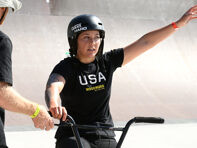Earlier this month, cycling’s world governing body, Union Cycliste Internationale, announced it would review its policies on transgender women in the sport.
The review, according to UCI officials, stems from “concerns” from some cisgender women competitors on the heels of American Austin Killips winning the Tour of the Gila in New Mexico April 30.
With the UCI seeking consultation from member national governing bodies, USA Cycling put out an online anonymous survey on the issue last Friday night to its members.
Since the survey was introduced, there’s been criticism from many quarters. One of the most prominent critics was Randy Locklair, the former USA Cycling membership director and current team director for Be Cyclocross.
In a blistering email directed to the governing body’s leadership, Locklair said the survey was “equivalent to asking your membership if Black folks should be allowed to race.”
“How f—-g dare you put the rights of trans folks up for a membership vote. Are you out of your g———-d minds,” he wrote. “You have failed to diversify this sport. You have failed to keep your membership safe. You have made tokens of the few marginalized people you “support” and you have ignored the rest.”

The survey itself opens with a poorly worded question. The choices for gender identity lumps all transgender competitors as one group, regardless of how said person identifies.
Deeper into the survey, a number of questions directly pertain to the issue of “fairness.” Some feel such questions are a means to skew opinion against trans people by assuming their presence makes the race “unfair”. The International Olympic Committee’s Framework for Fairness guidelines frown on such presumptions.
In many places, such questions are side-by-side on the same metric. Samuel Hansen, a nonbinary cyclocross racer and a participant in USAC’s inaugural nonbinary national championship race last December, pointed out such flaws based on their own experience as a mathematician.

“I can tell you from a methodological point of view the survey was very poorly designed,” Hansen said. “In fact, given that an inclusion question was asked right before an exclusion question that both relied on the same likely scale it is even likely to cause major issues with inaccuracy of responses.
“Take that combined with the limited distribution, I am a USAC rider but I was not sent a survey. Individual links were not single use and therefore could be spread online and someone could submit theirs multiple times or even script up a voting not very quickly.”
Hansen and others mirrored Locklair’s contention over whether the survey should have been commissioned at all.
“There is a deep need for USAC to talk to the people who are actually involved,” they said. “To have real conversations with the trans athletes who are a part of the support they supposedly govern and to listen to what they need in order to feel that they can take part in cycling, safely and comfortably.”

Another competitor in last year’s groundbreaking championship event, cyclocross racer Hen Watts, said it was “embarrassing for a governing body to be so spineless as to send out an anonymous survey to gauge people’s interest in the exclusion of trans people.
“It’s so frustrating as a trans woman to see the goal posts continue to shift and to see progress so regularly undermined. I was excited that nonbinary categories were cropping up at races ranging from grassroots community cyclocross, to the biggest gravel events in the nation, all the way to USAC Cyclocross Nationals. Now I fear that it’s going to be weaponized as a place to push trans women to. I was excited to see more and more openly genderqueer athletes competing at the highest levels. Now I fear for their safety and my own.”
Some within the sport claim that a review is necessary, due to Killips’ recent successes. Killips’ win in April stands alongside their first UCI cyclocross victory last November.
Two weeks after that win, Killips finished third in the women’s elite championship race at USA Cycling Cyclocross Nationals.

Among those critical of the current regulations is the person who finished fourth behind Killips at Cyclocross Nationals. Hannah Arensman announced her retirement from competition at age 25, citing transgender women as a factor in her decision.
Recently, she has appeared on many anti-trans media outlets to further explain her decision and views.
“It is never right to have to end your season that way flanked on either side by two guys in the elite women’s field,” Arensman said to Fox News Wednesday. “I don’t want to see any other girls young or my age or older have to go through that.’
To retired and outspoken mountain bike professional Amanda Batty, the survey is a knee-jerk reaction born of cisgender athletes who have views similar to Arensman.
Talking to Outsports, Batty was pointed in her opposition to those views.
“It’s honestly embarrassing that so many mediocre cis women feel the need to talk out the sides of their heads about how trans women are allegedly ‘shutting out’ those same mediocre women — because those cis women are the only folks threatening women’s sporting,” she said. “Why aren’t these cisgender women screaming about the lack of media coverage, or the lack of equal early-development opportunities? Why aren’t they whining endlessly about increased access for women and girls globally?”
With survey set to close Friday, USA Cycling’s findings, along with other national governing bodies, will play a part in the UCI’s deliberations. The world governing body has said they will make a final decision during a scheduled meeting in Glasgow, Scotland this coming August.





































